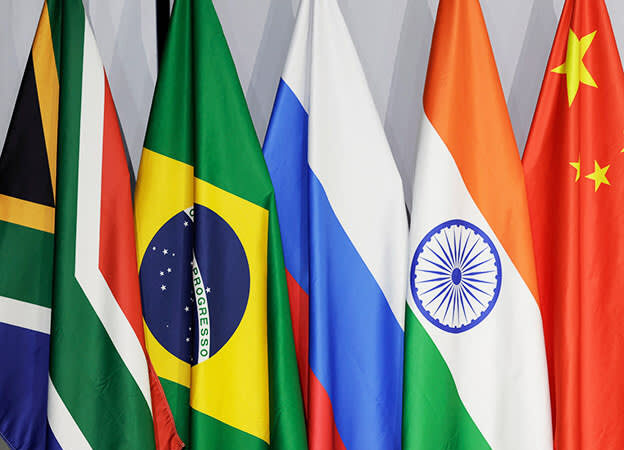
- Brics+ members will control 42 per cent of global crude oil output
- Will this supercharge plans for a dollar rival?
The biggest surprise from last month’s Brics summit was not that the group expanded, but just how many countries were invited to join. The original grouping of Brazil, Russia, India, China and South Africa extended an invitation to the UAE, Egypt, Iran, Argentina, Ethiopia and Saudi Arabia. The new entrants will more than double the size of the bloc, and no one knows quite what to call it: even the best efforts of an online anagram solver can’t turn BRICSUEIAES into a pithy acronym. Perhaps Brics+ for now.
It’s not only the name that is affected: the new invitees will also impact the structure of global trade. The current group controls around 23 per cent of global exports and 19 per cent of global imports. Analysts at Dutch bank ING calculate that the new members would add 3.7 and 3 percentage points, respectively, to those totals. This might sound like a marginal increase, but it would expand the group’s overall share of global trade by around 16 per cent.
ING economists also point out that the new members “seem to reflect the growing trade ties with the original Brics countries”. As the chart shows, the current bloc has grown as a share of new members’ imports, rising from 23 per cent in 2015 to 30 per cent last year. The share of exports has also grown.
The introduction of Saudi Arabia, the UAE and Iran also significantly increases the energy dominance of the group. The current Brics members make up around 20 per cent of global oil output, ING notes, which will increase to 42 per cent with the new additions. This raises the million-dollar question: will a rapid expansion – particularly among oil exporters – add momentum to a move away from the US dollar?
In one sense, the thorny geopolitics of the new arrivals could make this more feasible. Given sanctions, any buyers of Iranian crude oil are already paying in non-dollar currencies. What’s more, there have reportedly also been discussions over Saudi Arabia accepting the Chinese yuan for its crude oil. Yet it is worth stressing that energy only comprises 15 per cent of global trade – ING stresses that “Saudi pricing oil exports to China and India in non-dollar currencies does not end the dollar as the international currency of choice”.
Tellingly, a declaration released at the end of the summit made no mention of a common currency, referring instead to “encouraging the use of local currencies in international trade and financial transactions between Brics as well as their trading partners”. Michael Langham, emerging markets analyst at Abrdn, says “concerns around the group challenging dollar hegemony for now seem overblown”.
Even with five members, the group struggled to agree, and Langham emphasised that “it would be a mistake to view members’ geopolitical aims as homogenous”. He added that Brazil, India and South Africa have all pushed back on the group being seen as a direct challenge to the West, while India remains concerned that the bloc will prove a way for China to expand its influence. In a note released after the conference, TS Lombard chair Lawrence Brainard said that against these real geopolitical tensions, “the traditional Brics issue of US dollar hegemony pales into insignificance”.
Although a Brics currency looks distinctly unrealistic, we probably won’t stop hearing about it. Abrdn’s Langham described the desire to reduce use of the US dollar as a “clear common goal” amid a sea of competing aims. But developing one would require members to relinquish control over their exchange rates and/or monetary policy – a tough ask, and one that looks particularly hard for the likes of Saudi Arabia, whose currency is pegged to the US dollar.
TS Lombard’s Brainard said that “rather than repeating the hackneyed, ideological slogans against dollar hegemony that have been rolled out at previous summits, a new Brics+ needs to come up with concrete initiatives that address the concerns of the countries that are likely to join”. But putting currency on the agenda is far easier than juggling the competing goals (and political systems) of an 11-strong group. For this reason alone, we haven’t heard the last of the subject.




